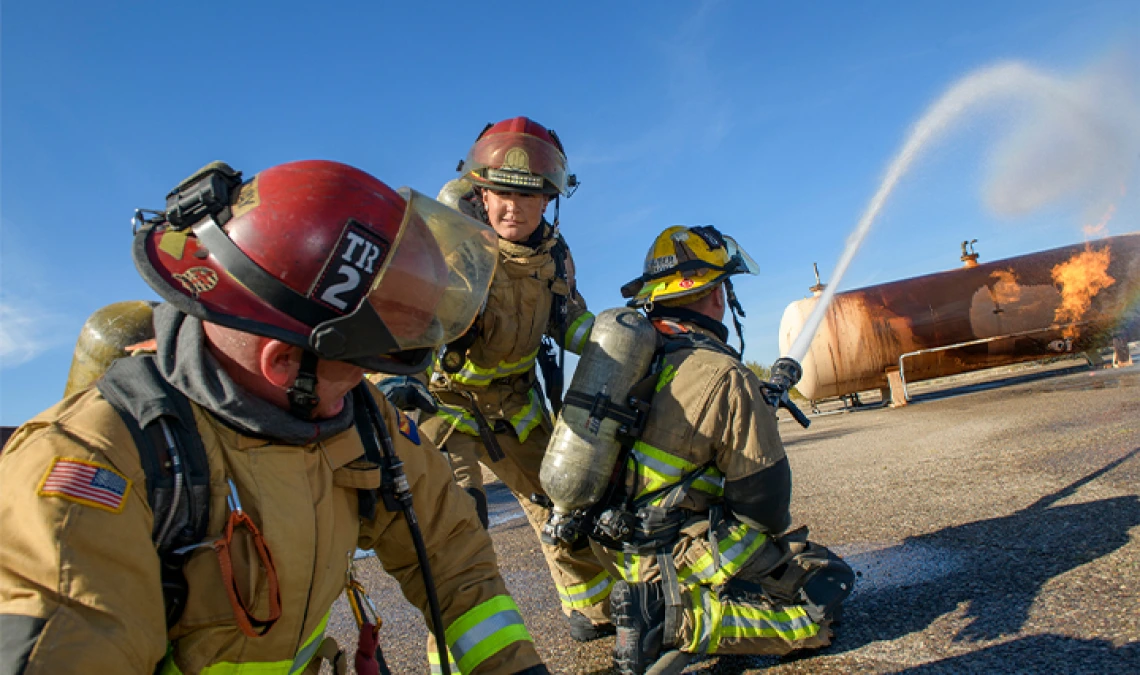Researchers Studying Stress, Cancer Risk and Reproductive Toxicity in Women Firefighters
A $1.5 million FEMA grant is funding a University of Arizona Health Sciences study designed to understand the occupational risks unique to women in the fire service, including those at the Tucson Fire Department.

Researchers at the University of Arizona Health Sciences are undertaking a study to better understand the potential environmental and occupational health risks specific to women in the fire service.
Funded by a $1.5 million grant from the Federal Emergency Management Agency, the study will examine how being a firefighter affects women’s stress levels, as well as their risk of cancer and reproductive toxicity, or adverse reproductive health outcomes.
Burgess-Jeff_klh5147.jpg
 Jefferey L. Burgess, MD, MPH
Jefferey L. Burgess, MD, MPH “More and more women are joining the fire service,” said Jefferey L. Burgess, MD, MPH, professor and associate dean for research at the UArizona Mel and Enid Zuckerman College of Public Health and a UArizona Cancer Center research member. “It’s imperative for us to understand the occupational risks that may be unique to these women and how we can help make their jobs safer in the future.”
The three-year study will recruit 200 women – 100 incumbent firefighters and 100 new recruits – at departments around the United States, including locally at the Tucson Fire Department. Comparing incumbent firefighters with new recruits will help identify potential differences in reported stress and markers in blood associated with increased cancer risk.
“We know very little about the health of women firefighters because they are a minority in the fire service,” said Leslie V. Farland, ScD, whose research will focus on the reproductive health of the women participating in the study.
According to Dr. Farland, prior research suggests that women firefighters may be at increased risk of miscarriage and preterm birth compared with the general population. She is particularly interested in measuring levels of anti-Mullerian hormone (AMH), a hormone that can be used to assess ovarian reserve, or the number and quality of a woman’s egg supply, which is a measure of reproductive health.
01072021-Lily Pesqueira-firefighter_klh5804.jpg
 The Tucson Fire Department is one of several fire departments around the United States participating in the study, which is comparing incumbent firefighters with new recruits to help identify potential differences in reported stress and markers in blood associated with increased cancer risk.
The Tucson Fire Department is one of several fire departments around the United States participating in the study, which is comparing incumbent firefighters with new recruits to help identify potential differences in reported stress and markers in blood associated with increased cancer risk. AMH levels naturally decrease as women age, and preliminary research has suggested that the number of years a woman spends working in the fire service may influence her AMH levels to a higher extent than would be expected by age.
“I'm excited about the incorporation of AMH as a biomarker of ovarian reserve,” Dr. Farland said. “It has been used clinically for about a decade to predict ovarian response to infertility treatment. There is research that suggests AMH is associated with time of menopause. There has also been some evidence of an association between AMH levels with some types of cancer that, but that is a new area of investigation.”
Along with tracking new recruits through their first 18 months of becoming a firefighter, the study includes a pilot intervention to explore potential benefits for reducing stress. A “virtual kitchen table” will be developed to help foster camaraderie and communication between women firefighters in the workplace.
“Throughout my career, it has been encouraging to see an increased emphasis on cancer and mental health,” said Lily Pesqueira, a captain and 20-year veteran of the Tucson Fire Department. “The knowledge that has come forward has made a huge impact on the fire service as a whole. I believe this latest study will help women, especially younger women just beginning their careers, to know that they will be safer than ever before.”
The Tucson Fire Department welcomed a new class of 36 recruits in January. Among the group are three women who will be offered the opportunity to participate in the voluntary study as part of the new research grant and Dr. Burgess’ ongoing collaboration with the department.
Dr. Burgess previously collaborated with the UArizona College of Engineering to examine how to reduce cancer risk among firefighters by evaluating exposure to carcinogens throughout the work shift, measuring biomarkers of carcinogenic effect and testing the effectiveness of interventions to reduce carcinogen exposure. He has established a strong partnership with the Tucson Fire Department and other fire departments to advance research that may make a career in the fire service safer.
“Firefighters put their lives on the line for us every day,” Dr. Burgess said. “It's really important for those of us in academia to do research in partnership with the fire service to help provide them the answers they need to allow them to do their own job more safely.”
The study is funded by the Federal Emergency Management Agency (EMW-2019-FP-00526).



